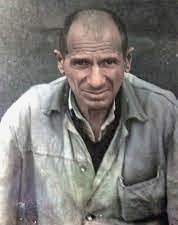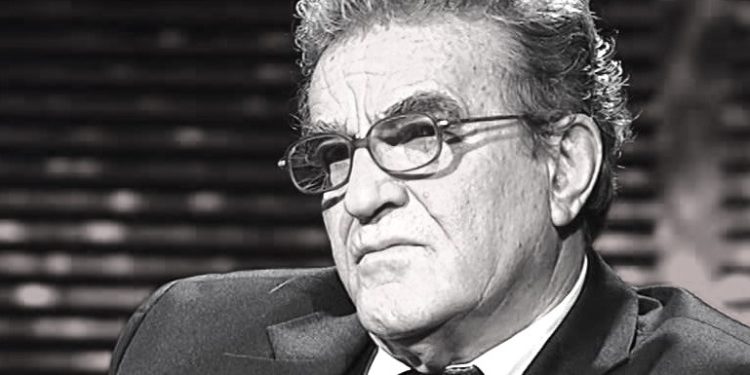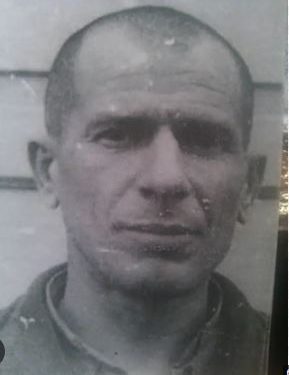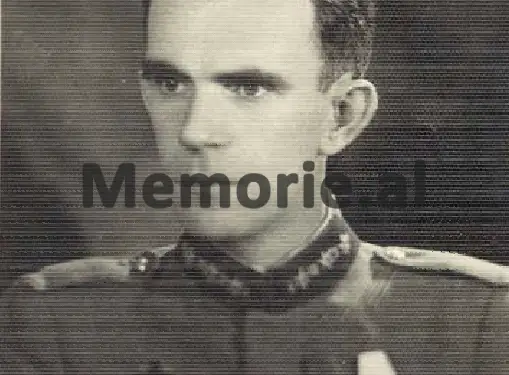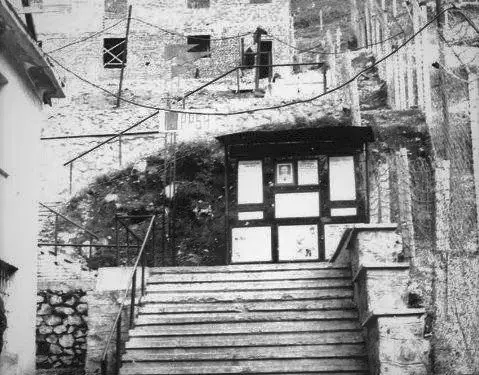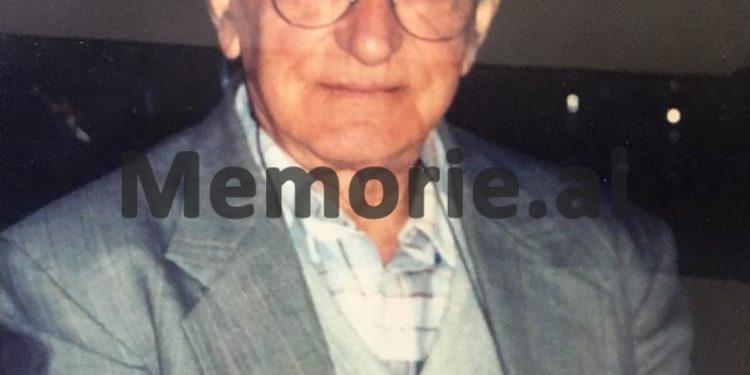From URAN BUTKA
Memorie.al / Sami Dangëllia, is one of the prominent figures of Albanian nationalization and resistance in the prisons of the communist dictatorship of Enver Hoxha and his successor, Ramiz Alia, where he suffered for 43 years. The diaspora newspaper, “Besa Shqiptare”, wrote about Sami Dangëllina: “He was a staunch anti-communist. Already in 1943, associated with the “National Front”, he propagated nationalist ideas and clearly explained the communist danger for Albania: “Everything will be collective and nobody will be entitled to anything.” Poverty will suffocate the country,” he said.
Thus, as a soldier of the ‘National Front’, Sami Dangëllia continued until the end of August 1944. In the great confrontation, Sami Dangëllia tried to avoid the collision of the civil war between the Albanians, so, after the open call for unification from the of the National Liberation Front, Sami Dangëllia, along with six other nationalists, surrendered on 10.09.1944 to the partisan forces in Lavdar i Korça and, from there, were transferred to the Second Brigade, where they fought for 3 months, against the Germans, until end of the War.
But, like all other soldiers, surrendered or joined the National Liberation Front, who were shot after the war or imprisoned and persecuted, Sami also suffered the same fate. He was arrested on the eve of the end of the war, as a former ballistic missile and imprisoned in Korça. After investigations and severe torture, he was tried by the Military Court of Korça, presided over by Koço Prifti and military prosecutor, Nevzat Haznedar, on November 8, 1945 and sentenced to life imprisonment.
In this court session, together with Sami Dangëllina, 26 other Albanians were convicted, most of them nationalists who had trusted the National Liberation Front and had joined it, mostly peasants from Kolonja, Korça and Bilishti.
Sami Dangëllia spent the first years of his sentence, almost 10 years, in Burrel Prison, where he met many intellectuals of the country, from whom he learned a lot and supplemented his culture. They were a great school for him. Then the years of internment and forced labor, in Radostina in Fieri and then in Plug in Lushnja.
Physical and spiritual tortures in concentration camps were no less than in prisons. The camp authorities and the operatives of the State Security considered Sami Dangelli as a dangerous enemy, so they did not leave any means unused to encourage his life and defeat him, but Sami Dangelli’s invincible, contemptuous and proud attitude was a well-deserved response to them.
To escape this hell, where he suffered with Mit’hat Arani, Viktor Dosti, Fatbardh Kup, Tahsim Spahina, Haxhi Mekolli, Bajazit Kaloshi, Leka Dosti and others, Sami Dangëllia escaped from the Plow camp on October 22 1952, together with Haxhi Mekolli, following the road Tomorrica – Skrapar – Opar – Korçë – Boboshtića – Dardhë – Nikolića. In Nikolica, he was caught by the border guards. Thus, he was put in the dock again, this time for “high treason against the motherland” by the Court of Lushnja and was sentenced, after inhumane torture, on 02/03/1960, to 25 years in prison. This was his second conviction.
Back in the horrible prison of Burrell. One of the veteran officers of the prison, when he saw Sami Dangëlli enter there again, said: “I expected him to come again, because this is where he belongs.” But his friends and other political co-sufferers welcomed him warmly. Sami told them: “Spiritually, I am calmer in prison. All Albanian life is a prison the size of Albania’s borders. To be free and submit to the communist dictate is moral death”!
Sami Dangëllia was nicknamed “Babagysh” in prison. No one called him by his real name. “That’s what Santa told me”, “That’s what Santa told me”, was said in the dark spaces of the prison. This epithet, not only for the sake of age and wisdom, but also because he was one of the first prisoners of the communist prisons, together with the patriots from Devolli: Kolë Tromara, Xhevdet Kapshtica, Sami Bitincka and, perhaps, others for intuitive reasons, that “Santa” would stay and die in prison.
Such was him, an indomitable resistance fighter, who resisted for 43 years in a row, just like other great resistance fighters, such as; Osman Kazazi, Eshref Zagorçiani, Pjetër Arbnori, etc.
Santa was sent to mine copper in Spaç. In the inhumane conditions of the Spaç Prison and the mine, Sami Dangëllia remained unbroken. And who else, apart from political prisoners, would extract copper and with it death, in those poisonous mines?! The guards called him “enemy in bed” and “old wolf”.
Precisely in Spaç, Sami was always among the organizers of the resistance and the anti-communist revolt, which broke out on May 21, 22 and 23, 1973. Sami Dangëllia was part of this revolt.
Writing about the Spaçi revolt and its heroes is not easy, even more so in front of those who are still alive and experienced those events themselves, which shook the communist dictatorship from its foundations, gave it the first blow and warned of the collapse of the system totalitarian. The Spaçi revolt is a high point in the history of the anti-communist resistance, the fight for freedom, justice, human dignity and democracy.
The main protagonists of the Spaç Revolt were: Pal Zefi, who started the rebellion first, on 21.05.1973, and at the same time Skënder Daja, Dervish Bejko, Hajri Pashaj – martyrs of the movement, as well as its heroes: Luan Burimi, Dashamir Kazazi, Hodod Sokoli, Luan Koka, Sami Dangëllia, Paulin Vata, Syrja Lame, re-sentenced with the 12 organizers, with 25 years in prison and the other 54 members of the revolt, who were re-sentenced with 25 years, as; Fadil Dushku, Gëzim Medolli, Demir Pojani, Kostandin Papaj, Rexhep Lazri, Ferit Kumanaku, Pal Marku, Bedri Çoku, Murat Marta, Jonuz Norja as well as others aged 20 and under such as: Çaush Çoku, Ndrec Çoku, or the ensign, as his fellow prisoners called him afterwards, Seliman Çuni, Sherif Allamani, Haxhi Bena, Mersin Vlashi who drew the eagle on the red flag, Naim Pashai, Napolon Koleci, Shuaip Seti, Nuredin Vargo and many others, a total of 60 convicts. Of these, 4 by firing squad, 15 to 25 years in prison and the others with heavy penalties.
The Spaci revolt was a political movement. It really erupted spontaneously in defense of the life of their friend, Pal Zefi, but immediately took a general and organized form with a leadership staff and, with mainly political demands, clearly defined. The main slogans of the revolt were: “We refuse to go to work.” The communist government of Tirana is vile. This government will soon be overthrown. There is no freedom, there is no democracy, and there is only dictatorship. We want justice. The army is with us. Soldier brothers, put down your weapons and join us! Down with communism! Down with Enver Hoxha! We want union with free Europe! Long live free Europe! Here’s death, here’s freedom, and we don’t go to the gallery anymore”! Etc.
After the physical fights with the guards and policemen, during the explosion of the dungeon doors, the breaking of the emulation boards, the dignified confrontations with the concerned prison authorities, the moment came for the confrontation with the Director General of Police and the Deputy Minister of Internal Affairs, Feçor Shehu. , to whom Hajri Pashai returned the country: “Soon you will come here, to our country. You are a vile, bloodthirsty government that oppresses the people, and you will soon pay for it here.”
After the “meeting” where Skënder Daja and Dervish Bejko spoke on behalf of all the prisoners, the greatest act was the removal of the red flag on the terrace, and then the installation of the flag with the double-headed eagle, which was marked by the bullets, but not landed and flew for the first time in the sky of the Albanian land, after 30 years, without the red star, the symbol of communism.
In all these actions, which history will appreciate, Sami Dangëllia also has his own role. This is known by all his co-sufferers, it is also known by archival documents. “Living archives” are also important.
I am giving only a testimony of Ilia Dhima, a former convict in Spaç, taken from the Archives of the Ministry of the Interior: “On May 22, 1973, the convict Sami Dangëllia, when the Deputy Minister of Internal Affairs spoke, asked me: How did he answer Hajri Pashai the deputy minister? I answered that I would be criminally responsible for these. – ‘Ah, the dog’s dog’! – said Sami and vented for him. Sami Dangëllia, during the first two days of the revolt, met with all the convicted persons, participants in the revolt, gave them instructions and returned to the room. During the night, dawning on May 22, 1973, since many convicts were not sleeping, shouting and throwing slogans against the party and the government, calling on the soldiers to hand over their weapons, shouting, ‘Down with communism’, Sami Dangëllia went out about 15 times from the room he met the crowd…”!
Immediately after the suppression of the revolt, the trial began against the organizers and its participants, contrary to the previous demagogic promises. The Supreme Court of the SSR, with a panel composed of Hilmi Telegrafi, chairman, and with the participation of the military prosecutor, Zaim Miftari, on 23.05.1973, with the greatest speed, to deal a blow to the revolt and a lesson for others, decided to shoot Skënder Daja, Dervish Bejko, Hajri Pashai and Pal Zefi, while the others, between them and Sami Dangëlli, the young woman sentenced to 25 years.
Accusation: “Participated in an organization against popular power, which aimed to commit the crimes of sabotaging the socialist economy and agitation and propaganda, aimed at undermining and weakening popular power, acts which are foreseen as crimes from articles 71 and 73/1 of the Criminal Code”.
The decision of the Supreme Court was final; it did not allow the defense or the speech of the defendants and was executed immediately.
Sami Dangëllia, the young man convicted for the third time, lined up again for forced labor in the mine galleries, until he died. Demir Pojani, one of the youngest members of the revolt, confesses: “Sami Dangëllia was one of the inspirers of the Spachi Revolt, but also one of those who kept us alive morally, after its suppression. “The more they torture us, the shorter the end,” Samiu told us…! When a co-sufferer told him: “Don’t speak loudly, because they will hear you”, Sami replied: “That’s why I am speaking loudly, so that they will hear me”!
Napolon Kaleci, from Cologne, says: “Even though he was sick, Sami took part in the Spachi Revolt. He gave us young people heart and strength. There is no other example in the world that has remained unbroken like Sami Dangëllia, 43 years in prison, 1944-1987”.
It was April 23, 1987. It rained as usual. The prisoners lined up. Sami was missing. The police found him seriously ill. He had never been absent, even when he was sick, because he did not accept mercy and indulgence. They did not act like the others, who in such cases used wood to get them to work. The prison doctor wrinkled his lips at the end of the visit and Sami’s fellow sufferers silently understood.
The beloved Santa was being separated from them; he was also being separated from the hellish sufferings of prison. They never thought that the invincible Sami Dangëllia would surrender to death. He closed his eyes in prison, without seeing his beloved parents, family members, without seeing the light of freedom, without being able to see the revolt of students and former political persecutors, in the years 1990-1991, which were following the Spaçi revolt, as well as the collapse of the communist dictatorship. /Memorie.al




